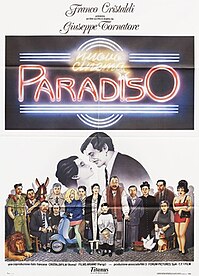Related Research Articles

The cinema of Italy comprises the films made within Italy or by Italian directors. Since its beginning, Italian cinema has influenced film movements worldwide. Italy is the birthplace of art cinema and the stylistic aspect of film has been the most important factor in the history of Italian film. As of 2018, Italian films have won 14 Academy Awards for Best Foreign Language Film as well as 12 Palmes d'Or, one Academy Award for Best Picture and many Golden Lions and Golden Bears.

Giuseppe Tornatore is an Italian film director and screenwriter. He is considered one of the directors who brought critical acclaim back to Italian cinema. In a career spanning over 30 years he is best known for directing and writing drama films such as Everybody's Fine, The Legend of 1900, Malèna, Baarìa and The Best Offer. Probably his most noted film is Cinema Paradiso, for which Tornatore won the Academy Award for Best Foreign Language Film. He has also directed several advertising campaigns for Dolce & Gabbana.

Mario Bava was an Italian filmmaker who worked variously as a director, cinematographer, special effects artist and screenwriter, frequently referred to as the "Master of Italian Horror" and the "Master of the Macabre". His low-budget genre films, known for their distinctive visual flair and stylish technical ingenuity, feature recurring themes and imagery concerning the conflict between illusion and reality, as well as the destructive capacity of human nature. He was a pioneer of Italian genre cinema, and is regarded as one of the most influential auteurs of the horror film genre.
Mondo films are a subgenre of exploitation films and documentary films. Many mondo films are made in a way to resemble a pseudo-documentary and usually depicting sensational topics, scenes, or situations. Common traits of mondo films include portrayals of foreign cultures, an emphasis on taboo subjects such as death and sex, and staged sequences presented as genuine documentary footage. Over time, the films have placed increasing emphasis on footage of the dead and dying.

Cinema Paradiso is a 1988 Italian drama film written and directed by Giuseppe Tornatore. The film stars Jacques Perrin, Philippe Noiret, Leopoldo Trieste, Marco Leonardi, Agnese Nano and Salvatore Cascio, and was produced by Franco Cristaldi and Giovanna Romagnoli, while the music score was composed by Ennio Morricone along with his son, Andrea. It won the Academy Award for Best Foreign Language Film at the 62nd Academy Awards.
Morra can mean:

Lajos Koltai, ASC, HSC, is a Hungarian cinematographer and film director best known for his work with legendary Hungarian director István Szabó, and Italian filmmaker Giuseppe Tornatore. He was nominated for an Academy Award in 2000 for his work on the film Malèna.
Rockets Redglare was an American character actor and stand-up comedian. He appeared in over 30 films in the 1980s and 1990s, including a number of independent films and mainstream films, such as After Hours (1985) and Desperately Seeking Susan (1985).
The Nastro d'Argento is a film award assigned annually, since 1946, by Sindacato Nazionale dei Giornalisti Cinematografici Italiani the association of Italian film critics.
The David di Donatello Award for Best Director is a film award presented annually by the Accademia del Cinema Italiano to recognize the outstanding direction of a film director who has worked within the Italian film industry during the year preceding the ceremony. The award was first given in 1956, and became competitive in 1981.
Richard Marks was an American film editor with more than 30 editing credits for feature and television films dating from 1972. In an extended, notable collaboration (1983–2010), he edited all of director James L. Brooks' feature films.

Franco Cristaldi was an Italian film producer, credited with producing feature films from the 1950s to the 1990s.

The 66th annual Venice International Film Festival, held in Venice, Italy, was held from 2 to 12 September 2009, with Maria Grazia Cucinotta serving as the festival's hostess. The opening film of the festival was Baarìa by Giuseppe Tornatore and the closing film was Chengdu, I Love You by Fruit Chan and Cui Jian. The international competition jury, chaired by Ang Lee, awarded the Golden Lion to Lebanon by Samuel Maoz.
Andrea Crisanti was an Italian production designer and art director.
Adriano Bolzoni was an Italian journalist, writer and film director.

Marco Risi is an Italian film director, screenwriter, film producer and cinematographer.

Roberto Andò is an Italian director, screenwriter, playwright and author.
Corrado Fortuna is an Italian actor and director.
Antonio Climati was an Italian cinematographer, filmmaker and film editor.
Mário Bastos, often known by the stage name Fradique, is an Angolan filmmaker. He is notable as the director of the critically acclaimed films Alambamento, Independência and Ar Condicionado. Apart from directing, he is also a writer, producer, assistant director and editor.
References
- 1 2 3 Roberto Poppi. Dizionario del cinema italiano. I registi. Gramese, 2002.
- ↑ "Tornatore all'oscar britannico". La Repubblica . 15 February 1991. Retrieved 3 March 2014.